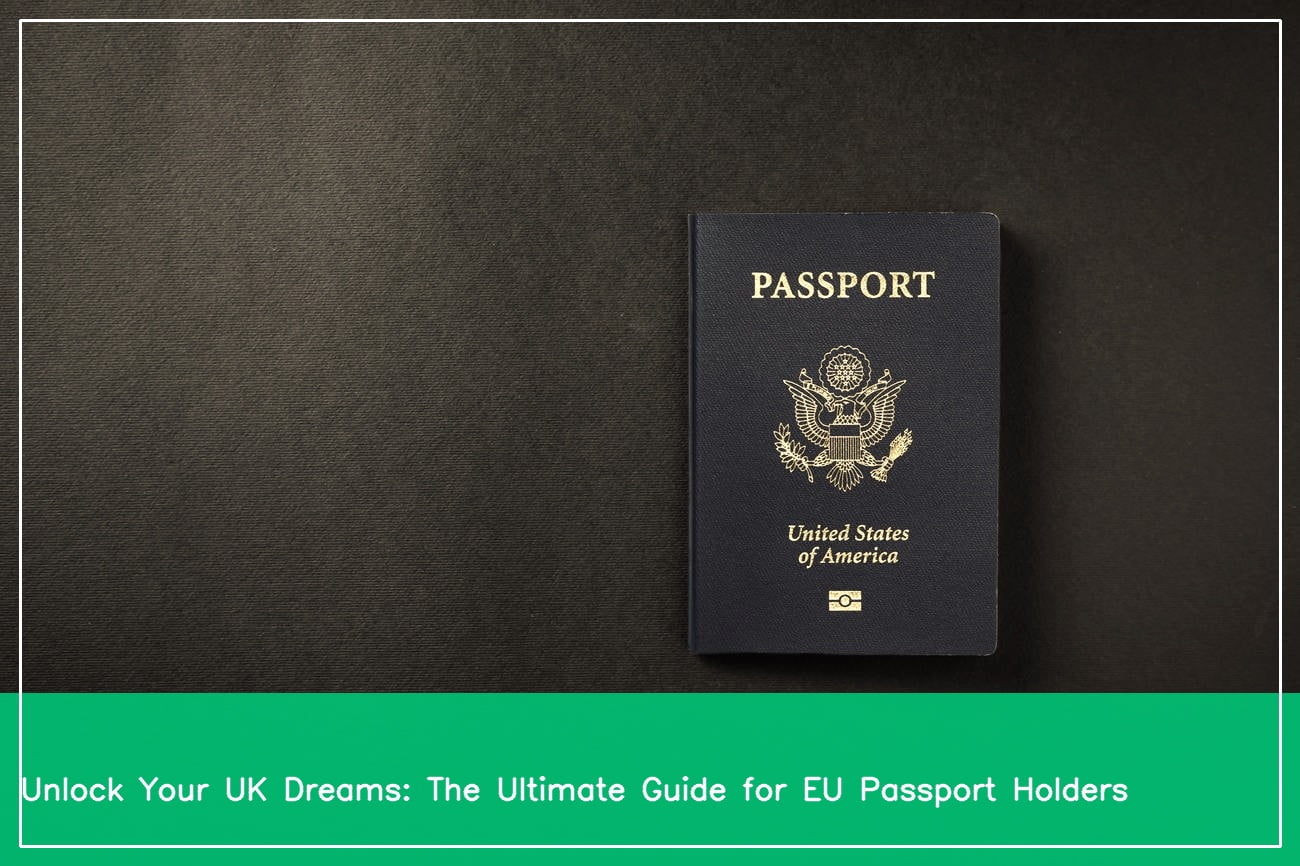In the wake of Brexit’s transformative impact on EU citizens’ lives, the question of moving to the UK with an EU passport has become more pressing than ever. This comprehensive guide delves into the complexities of the new immigration landscape, empowering EU nationals with the knowledge they need to navigate the post-Brexit landscape successfully. From eligibility criteria to visa requirements and the implications of settled status, we’ll explore every aspect of relocating to the UK as an EU passport holder post-Brexit. Join us as we embark on a journey through the intricacies of immigration in a transformed landscape, ensuring a smooth transition for EU nationals seeking to call the UK home.

Key Takeaways:
EU citizens can move to the UK after Brexit with several visas, including the EU Settlement Scheme, Family Permit, UK family visa, Skilled Worker visa, Frontier Worker Permit, Innovator visa, High Potential Individual visa, and Graduate visa.
EU citizens can enter the UK with a valid national identity card to exercise their right of free movement within the EEA, Switzerland, and the UK (until 1 October 2021).
EU citizens will need to obtain a visa to stay in the UK for longer than six months after the transition period ends on 31 December 2020.
Can I Move to the UK with an EU Passport?
Navigating the complexities of moving to the UK as an EU citizen post-Brexit can be daunting. However, understanding the available options empowers you to make informed decisions about your relocation.
Can EU Citizens Move to the UK with a Passport?
After Brexit, EU citizens moving to the UK can do so primarily through visas. These include:
EU Settlement Scheme (EUSS): If residing in the UK before the Brexit transition period (1 January 2021), EU nationals can apply for settled or pre-settled status.
EU Settlement Scheme Family Permit: Allows family members of EU nationals with pre-settled or settled status to join them in the UK.
UK Family Visa: EU citizens who are immediate family members (spouse, civil partner, unmarried partner, child, parent, or grandparent) of a British citizen or settled person can apply.
Skilled Worker Visa: Open to EU nationals with a job offer from a UK employer sponsoring skilled workers.
Frontier Worker Permit: For EU citizens living in an EU country near the UK and commuting to work in the UK.
Innovator Visa: For EU nationals with innovative, viable business ideas seeking to establish or join a UK business.
High Potential Individual Visa: For EU citizens who are recent graduates from top universities or have a promising business idea.
Graduate Visa: For EU graduates of UK universities who want to work or look for work in the UK after completing their studies.
Alternatively, until 1 October 2021, EU citizens can enter the UK with a valid national identity card to exercise their right of free movement within the EEA, Switzerland, and the UK.
Important Considerations
The transition period ends on 31 December 2020. After this date, EU citizens will need a visa to stay in the UK for longer than six months.
The EUSS application deadline is 30 June 2021. EU nationals who miss this deadline may lose their right to live and work in the UK.
Visas and permits come with specific requirements and eligibility criteria. Research and ensure you meet the criteria before applying.
For more information on visas, visit the UK Government website.
Determined to travel with your furry companion? Discover the possibility of obtaining an EU Pet Passport to ensure a seamless journey. Click here to learn more
If you’re a UK resident with a beloved pet, explore the guidelines and requirements for obtaining an EU Pet Passport to pave the way for international adventures. Check it out
Residing in Ireland and eager to embark on pet-friendly travels? Unravel the process of acquiring an EU Pet Passport for your furry friend, ensuring a smooth cross-border experience. Read more
Embark on a journey of opportunities and discover whether possessing an EU passport grants you the freedom to live and work in the UK. Explore the possibilities
Unleash the potential of living in Spain with an EU passport, opening doors to a vibrant lifestyle and rich cultural experiences. Explore your options
Navigate the post-Brexit landscape and uncover the possibilities of working in the UK with an EU passport. Discover the path
For those residing in the UK, unravel the intricacies of obtaining an EU Pet Passport for your beloved companion, ensuring smooth travel adventures. Get the details
Deadline for Applications
The door is closing for EU nationals looking to settle in the UK. To maintain your rights to live, work, and study in the UK if you’re an EU citizen, you’ve got to apply for the EU Settlement Scheme.
The deadline is 30 June 2023, so don’t delay, or you could be facing an uncertain future.
It’s a straightforward process, and it doesn’t cost a thing. All you need to do is provide proof of your identity and residence in the UK.
Tick-tock, tick-tock… the clock is ticking. Apply now and secure your place in the UK.
Key Takeaways:
- EU citizens must apply for the EU Settlement Scheme to continue living and working in the UK after Brexit.
- The deadline for applications is 30 June 2023.
- The process is straightforward and free of charge.
- Applicants must provide proof of identity and residence in the UK.
- Applying by the deadline is crucial to avoid losing the right to live and work in the UK.
Sources:
- UK Government: Apply to the EU Settlement Scheme
- The Guardian: Brexit: deadline looms for EU citizens to apply for settled status
Proving eligibility for settled status
Moving to a foreign country is never easy, and the UK is no exception. EU nationals who have made the UK their home now face additional complexities due to Brexit. If you’re an EU citizen wondering how to prove your eligibility for settled status in the UK, this guide will help you navigate the process.
How to Check Eligibility
Determining your eligibility for settled status is crucial before applying. To qualify, you must have been continuously resident in the UK before the end of the transition period on 31st December 2020.
Documents Needed
The key to a successful application is providing the correct documentation. You’ll need to prove your identity, nationality, and residency in the UK. Acceptable documents include:
- Passport or national identity card
- Proof of residency, such as utility bills, tenancy agreements, or council tax bills
- P60 or payslips showing you’ve been working in the UK
- Any other documents that support your residency claim
Applying Online
The application process is straightforward and can be completed online. You’ll need to create an account on the UK government website and follow the instructions to submit your application.
Decision and Share Code
Once your application is submitted, you’ll receive a decision within a few weeks. If successful, you’ll be granted settled status and issued a share code. This code can be used to prove your status to employers, landlords, and other organizations.
Using National ID Cards
As an EU citizen with settled status, you can use your national identity card to enter the UK until 1st October 2021. After this date, you’ll need to use your passport or a biometric residence card.
Key Takeaways:
- To be eligible for settled status, you must have been continuously resident in the UK by 31st December 2020.
- Supporting documents include passports, national identity cards, proof of residency, P60s, and payslips.
- Apply online through the UK government website.
- A decision is usually made within a few weeks, and successful applicants receive a share code.
- EU citizens with settled status can use their national identity cards to enter the UK until 1st October 2021.
Sources:
- EU passport holders with settled status allowed to use national ID cards to enter UK
- Leaving and re-entering the UK
Benefits of settled status
If you’re an EU national who’s lived in the UK for five years or more, you can apply for settled status. This will allow you to continue living, working, and accessing public services in the UK as you currently do.
Here are some of the benefits of settled status:
- You can continue living in the UK indefinitely.
- You can work in the UK without needing a visa.
- You can access public services, such as healthcare and education, on the same terms as UK citizens.
- You can apply for British citizenship after holding settled status for 12 months.
- You can bring your family members to the UK if they are eligible.
Since the process to obtain citizenship is long and complex, getting settled status can be a stepping stone in the path to citizenship, assuring an easier path to settling in the UK and boosting your chances of becoming a UK citizen in the future.
Steps to apply for settled status:
- Check if you’re eligible.
- Gather your documents.
- Create an online account.
- Complete the online application form.
- Pay the application fee.
- Attend a biometric appointment (if required).
- Receive a decision on your application.
Key Takeaways:
Settled status allows EU citizens to remain in the UK indefinitely, work, and access public services.
Obtaining settled status is a stepping stone to becoming a full UK citizen.
Settled status simplifies proving residency in the UK.
Settled status allows immediate family members to join EU citizens in the UK.
Settled status provides peace of mind for EU citizens concerned about their future in the UK after Brexit.
Citations:
EU Settlement Scheme: Settled and pre-settled status – GOV.UK
What settled status means for EU citizens in the UK

FAQ
Q1: Can I move to the UK from the EU after Brexit with an EU passport?
A1: Starting from the end of the transition period on 1st January 2021, EU citizens who wish to move to the UK must have either pre-settled or settled status to live, work, and study in the UK. Those who do not have these statuses need to apply for a visa.
Q2: What is the difference between settled and pre-settled status for EU citizens in the UK?
A2: Settled status is granted to EU citizens who have lived in the UK for five years and allows them to continue living, working, accessing public services, and accumulating a state pension in the UK indefinitely. Pre-settled status is granted to those who have lived in the UK for less than five years and allows them to remain for a further five years while applying for settled status.
Q3: How do I apply for settled or pre-settled status in the UK?
A3: Applications for settled and pre-settled status are made online through the UK government website. The applicant will need to provide proof of their identity, residency in the UK, and any relevant criminal record information.
Q4: Can EU citizens with settled status travel to the UK with their national identity card?
A4: Yes, EU citizens with settled status can use their national identity card to enter and leave the UK until October 2025. After this date, they will need to use a passport.
Q5: Can family members of EU citizens apply for settled or pre-settled status?
A5: Yes, family members of EU citizens, including spouses, children, and parents, may be eligible to apply for settled or pre-settled status if the relationship existed before December 31, 2020.

